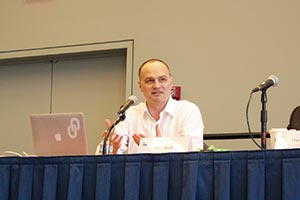Senior Reporter
Federal Policy on Autonomous Vehicles Needed to Enable Rollout, Backers Say

This story appears in the Jan. 30 print edition of Transport Topics.
WASHINGTON — Advancements in self-driving vehicle technology require a set of national guidelines aimed at promoting safety and ensuring smooth connectivity across freight corridors, Rep. Debbie Dingell (D-Mich.) said Jan. 25.
The congresswoman, echoing many of her colleagues in Congress and industry stakeholders, acknowledged transportation policymakers should look to approve policies with a focus on autonomous vehicles and privacy concerns stemming from vehicle-to-vehicle and vehicle-to- infrastructure communication.
Next month, she said, her colleagues intend to hold a meeting on the matter. Transportation leaders have not indicated when they would consider related legislation.
“Democrats and Republicans understand that this is transformational, that it’s coming,” Dingell said at a panel on Capitol Hill meant to preview the Washington Auto Show. “We need to make sure that it’s a coalition of industry, consumers … everybody working together that will help develop the correct public policy.”
She also emphasized the U.S. Department of Transportation’s recent designation of 10 testing sites for automated vehicle technologies nationwide has the potential of creating a network for experts to enhance safety features.
“To create a community to share information is going to be very, very important,” Dingell said.
At a separate event, James Burnley, who served as secretary of transportation for President Reagan, said he agreed the freight industry and automakers would benefit from a policy framework. He warned, however, that proceeding with stringent regulations would potentially impede economic growth.
“I would caution against too aggressively encouraging the federal government to set standards in these areas because the standards are likely … to inhibit innovation and the adoption of technology over time,” Burnley said at the Eno Center for Transportation’s Jan. 26 policy seminar previewing the Washington Auto Show.
Stephen Boyd, co-founder and vice president of external affairs at Peloton, stressed he does not expect trucks to operate without drivers in the foreseeable future. Drivers will be needed to assist with managing autonomous systems, especially as regulations are adopted to facilitate the use of the technology.
“It’s going to take quite some time to be approved by regulators,” Boyd said at the Eno event. Peloton specializes in connected vehicle technology that synchronizes the braking of two trucks as a way to enhance aerodynamics.
The proving ground pilot sites for automated vehicles that the U.S. Department of Transportation announced Jan. 19 included Pittsburgh and the Thomas D. Larson Pennsylvania Transportation Institute, the U.S. Army Aberdeen Test Center in Maryland, the American Center for Mobility at Willow Run in Michigan, the Contra Costa Transportation Authority & GoMentum Station in California, the North Carolina Turnpike Authority and the Texas AV Proving Grounds Partnership.
“With five of the nation’s 15 fastest-growing cities in Texas and our population expected to potentially double by the year 2050, Texas must be a leader in new technology that addresses transportation challenges,” Marc Williams, deputy executive director of the Texas Department of Transportation, said in a press statement on Jan. 24. “This partnership puts Texas at the forefront of automated vehicle technologies that likely will shape the future of transportation around the world.”
Semi-autonomous truck technology already is making its way on highways. In November, a semi-autonomous truck operated by Otto, a technology firm, cruised on Ohio’s highways, prompting state officials to announce an investment of $15 million for vehicle-to-infrastructure projects.
Last fall, the National Highway Traffic Safety Administration issued guidelines on autonomous cars that outline state and federal roles managing the technology. Proponents of the technology argued the guidelines did not go far enough.
The Washington Auto Show convenes through Feb. 5 here at the Walter E. Washington Convention Center.

